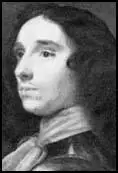John Carew

John Carew was born in Antony, Cornwall. Educated at Oxford University and the Inner Temple, he was elected to the House of Commons in 1646 where he emerged as a leading critic of Charles I.
On the outbreak of the Civil War supported Parliament and served on the Navy Committee (1646-52) and the Council of State (1651-53). He also signed the death warrant of the king in 1649.
Carew retained his radical political ideas and became a member of the Fifth Monarchist group that sought the abolition of tithes, an increase in the help for the poor and the release of debtors from prison. He also opposed to the dictatorial rule of Oliver Cromwell.
Carew who represented Devon in the Parliament of Saints. Carew did not object to government by a single person, but soon expressed his hostility to the Cromwellian protectorate and his suspicion regarding its hereditary pretensions in a work called The Grand Catastrophe (January 1654). His opposition to Cromwell was reflected in his rumoured involvement in 1654 in the ‘Wildman' plot with its call to arms against the protector, and in his demand for the release of two Fifth Monarchist preachers, Christopher Feake and John Rogers, in February 1655.
Carew refused to recognize the legitimacy of the regime and declined to answer a summons from Cromwell, saying that "when the little (Barebone's) Parliament was dissolved (Cromwell) took the crown off from the head of Christ and put it upon his own". This led to his imprisonment in mid-February 1655, where he remained until October 1656.
Carew declined to join Thomas Venner's planned Fifth Monarchist rising in 1657, and by early 1658 represented those millenarians who undertook to be baptized, and who sought an alliance with the Baptists, with whom Carew held discussions at Dorchester. He was eligible to sit in the restored Rump in May 1659, but although he was reappointed as a navy commissioner (26 May), he made no recorded impression on the proceedings, and was eventually fined £100 for his absence.
On the Restoration Carew was an obvious target for the Royalists. He refused to flee the country and was therefore like other Regicides arrested and brought to the Tower of London. At his trial in October 1660 he was found guilty of treason and was sentenced to be hung, drawn and quartered.
Carew went to the scaffold expecting to receive a "glorious crown" from Christ, and confident that his prosecutors would be destroyed by the wrath of God, and by the "resurrection of this cause". He said that his own blood would "warm the blood that had been shed, and cause notable execution to come down upon the head of their enemy".
Primary Sources
(1) Jason Peacey, John Carew : Oxford Dictionary of National Biography (September 2004)
An energetic member of the Rump, Carew served on the army committee and the committee for plundered ministers, and was elected to the council of state in February and November 1651. His interests included the disposal of church and crown property, and cases regarding suspects and delinquents. He demonstrated enthusiasm for legal reform and was involved in selecting the Hale commission, and displayed concern for social reform and the welfare of the poor, the indebted, and the imprisoned. During the First Anglo-Dutch War he developed an expertise in both diplomatic relations and naval affairs. He also became identifiable as a leading millenarian and Fifth Monarchist, alongside his close friend Thomas Harrison. He represented Devon in Barebone's assembly of 'saints', and was reappointed to the council of state in July and November 1653, but although identifiable as a supporter of religious toleration Carew's preoccupation with his duties as a navy commissioner precluded him from an active role in the Commons.
Student Activities
Military Tactics in the English Civil War (Answer Commentary)
Women in the English Civil War (Answer Commentary)

